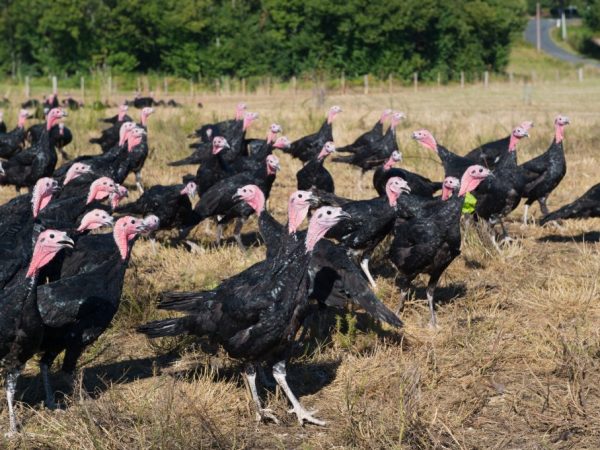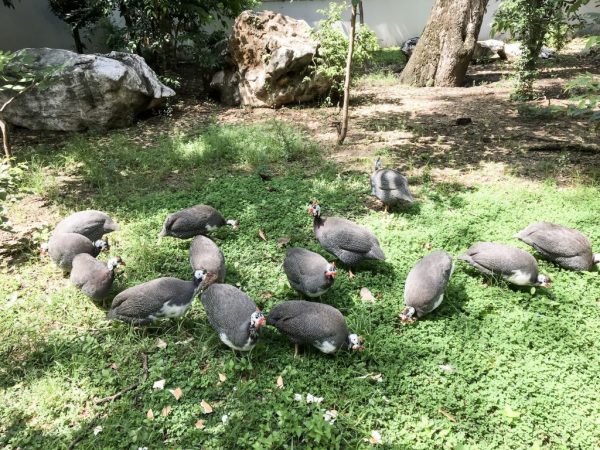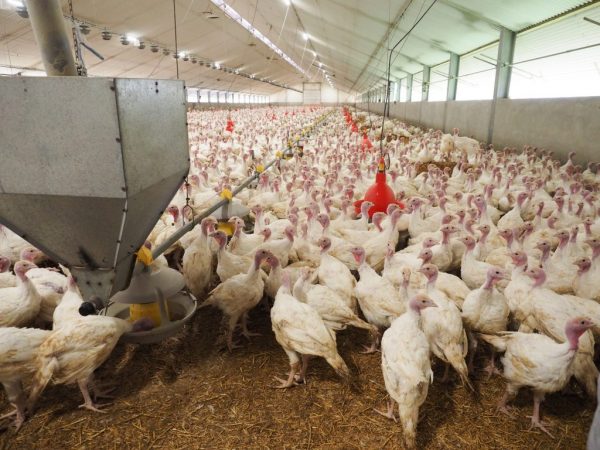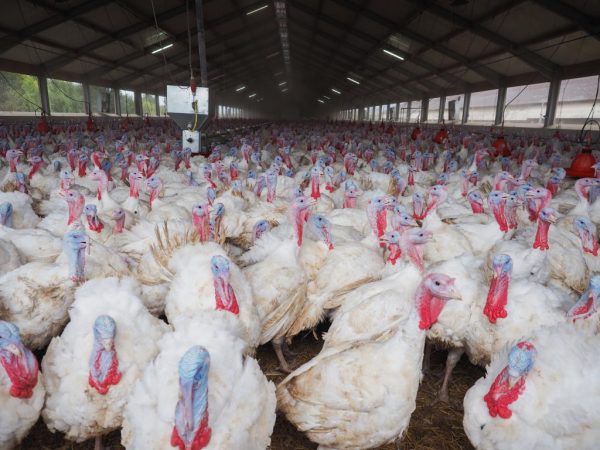Is it profitable or not to breed turkeys as a business
Breeding turkeys as a business is in great demand today. Many farmers have heard that there is a business related to raising turkeys, and this type of income is becoming more and more popular. The popularity of the business is based on easy bird care, low costs, and there is a strong demand for dietary meat. But to understand whether such a business is profitable or not, you need to thoroughly calculate everything. Breeding turkeys as a business needs to be organized properly. In addition, the better your knowledge, the healthier your charges will be, and the productivity and profitability of your activity also depends on it.

Benefits of breeding turkeys
Turkeys as a business require careful selection of breed for breeding... Not all types of birds are suitable for meat production, for example. You also need to decide on the purpose of the business, perhaps you will raise individuals and sell them to breeders, then you need to choose the most beautiful and undemanding breeds. Some novice breeders acquire versatile breeds that quickly gain weight and boast of their unpretentiousness. Before purchasing a livestock, you should carefully read all the characteristics, watch photos and videos.
Business planning
The turkey business starts with an idea of what result you need and what paths you decide to go in order to achieve your goals. First, decide why you need to grow turkeys as a business and what product do you want to make money with? It could be meat hatching eggs, young or adults. The choice of inventory and the actual breed of bird itself depends on this choice.
After the type of sale and the breed of poultry are determined, it is necessary to figure out in what form you will keep your birds, and in what quantity, also study in more detail all the nuances of caring for turkeys.
To properly plan your business, you need to find out about prices at the moment and how your costs may increase, say, in a year. It is necessary to draw up a cost plan, calculate the profitability, organize construction work and equip the premises for the turkeys. The last stage of creating a business is the disinfection of the future bird habitat, the purchase and settlement of turkeys. The final thing you definitely need to do is register your business with the relevant authorities.
How to choose a business direction?
The turkey business and its plan at home, as well as the choice of direction, first of all, begins with the characteristics of a certain type of turkey (it is difficult for novice farmers to guess about this). Find out all the information about the type of turkeys you want to breed, read the information about what diseases they are prone to, what is the optimal scale of the territory for their safe living, what climate is necessary for them.
After the information is received and studied, the type of cultivation is determined. You can choose a combined type of business, when half of the individuals grown for meat, the other half is for sale. You can also grow versatile breeds and sell what is currently required by the buyer. When you are firmly established in the turkey market, you can raise the price and set your own terms.
Livestock acquisition
For future business and earnings, the farmer can purchase eggs for the incubator, young individuals or adult layers. It is best to buy chicks that are 30 days old, it is at this age that the birds are hardy, strong and easily adapt to new conditions for them, they eat ordinary food. If you decide to buy eggs, then you need an incubator and time, since the chicks will not hatch right away, take care of special nutrition for newborn turkeys.
It is worth noting that some eggs may be without a chick, and there is also a chance of giving birth to sick turkeys. By purchasing young individuals, you immediately see their condition, which will clearly save your time and money. The best time to buy is February. Pay close attention to chick parents, learn about vaccinations, and see what a turkey looks like. For better bird survival, it is recommended to buy young stock of different litters.
How to choose a breed?

Light turkey breeds are easier to handle
If you are new to this business, it is best to buy light or medium breeds of turkeys. As for heavy crosses, they require different care and consume a lot of feed. Birds weighing less than 12 kg are easier to handle and their survival rates are much higher.
There are several types of turkeys that are considered the best for beginners.
- North Caucasian bronze. An excellent type of turkeys for pasture, their weight is 7-12 kg, 80 eggs are incubated.
- Bronze broad-breasted... A turkey for growing in cages, its weight is 9-11 kg, and the egg production reaches up to 120 pieces.
- In addition to these two breeds, there are also: Hybrid converter, Wagon, Big 6, white broad-breasted, but it is better to start them after working with turkeys, at least for 2 years.
How to grow turkeys
Cellular
For this type of cultivation, special tiered cells are placed indoors. This type of cultivation is optimal for light and medium types of turkeys at home. There must be ventilation, good lighting and heating in the house. In properly equipped cages, individuals grow at an active pace. Also, in this way, young stock are well raised for pedigree sale and the place is used wisely.
Often in such conditions, artificial insemination of turkeys is carried out in order to obtain hatching eggs. It is not recommended to keep one livestock of turkeys in cages for a long time, as the birds become more susceptible to diseases, and their appearance is poor. caged birds are well suited for quick slaughter or for sale at a young age.
Extensive
This type of turkey raising in the home is most suitable for farmers living in the southern regions, if raising birds extensively in cold areas can be difficult. Whether this is beneficial or not will ultimately depend on the particular breed. This type of cultivation requires a poultry house and the adjacent pasture area, which must be protected from precipitation and heat.
birds that have reached 2 months of age begin to be released for walking almost constantly, and this continues until the very slaughter. Turkeys feed on grass and insects themselves, which is excellent and positively reflected in the costs of the farmer. The extensive method of raising birds is well reflected in their immunity, such birds are less susceptible to diseases, and the percentage of marriage is reduced to a minimum.But, it is worth noting that this type of cultivation is suitable for those farmers who are ready to receive income only during the season. In these conditions, you can grow any breed of turkeys.
Floor
Outdoor turkey farming is recommended for all types of turkeys, and especially for heavyweights. In this case, it is not even worth thinking whether it is profitable or not, since the outdoor method of keeping requires the least costs. To raise birds with the floor method, you need to prepare a large room with light, good ventilation and heating. The floor should be 30 cm above the ground and should be insulated and covered with hay and softwood sawdust. The floor can be filled with gaps or nets so that all droppings, dirt and moisture do not linger on the floor surface.
Do not leave young animals on the bare floor, as small individuals can be trampled by older ones and there is also a possibility that the turkeys will choke on sawdust scattered on the floor. During outdoor rearing, turkeys must be divided by breed, by age. Use high baffles just in case the Turkeys don't fly away. These birds have wings and can fly over a small fence or fence. Remember that birds need plenty of room, so make sure there are no more than 3-5 turkeys per square meter, depending on their size.
Experienced turkey breeders recommend raising turkey poults in several ways at once, this will lead to maximum farm efficiency and profit for the business.
Features of breeding turkeys

Think carefully about the conditions of detention
Whether a turkey farm is profitable for you depends on how carefully you take care of the living conditions of the turkeys. If properly looked after, vaccinated young individuals and follow certain feeding rules, then the likelihood that the birds will get sick is reduced, and the taste of the meat in such turkeys is much better. It is best to make the room right away with the possibility of heating. In regions with cold winters, Turkeys may freeze in an unheated room. When crossing with different breeds, you need to consider the possible consequences, especially if you are just a novice breeder, it is recommended to start by breeding one breed.
In order for chicks to grow healthy and strong, it is necessary to pay due attention to the following factors
- Temperature and air.
- Food.
- The size of the area of habitation, population density.
- Genetic purity.
Prevention of possible diseases in turkeys
Some breeds of turkeys are prone to various diseases, which you need to know about before buying turkeys. find out about the symptoms of diseases and about all methods of treatment... In the initial stages of treatment, most diseases can be easily cured without much cost to you and harm to the bird. Even if the turkeys are not worried about anything, then they should be shown to the veterinarian for a preventive examination once every 6-12 months. From birth, do not save money and give the necessary vaccinations. If various diseases of turkeys occur, they should be transferred to a separate pen until the disease is completely cured.
Infectious diseases of turkeys
Infectious and parasitic diseases are dangerous for all turkeys, are transmitted quickly and lead to a negative result.
- Tuberculosis
- Worms
- Smallpox
- Histomoniasis
- Mycoplasmosis
Non-communicable diseases include
- Avitaminosis
- Goiter
Such diseases most often arise due to improper nutrition of birds, or according to the principle of some kind of genetic predisposition. These types of diseases are not dangerous to other birds.
House requirements
Adequate conditions are necessary to raise healthy and strong livestock, and one of them is warmth. In the poultry house where the Turkeys will be raised on the first day, it should be 36-37 degrees Celsius, then the temperature is reduced to 27 degrees.To heat the aviary, use burners (3-5 kW) and install them at a height of 70-90 cm. There must be several feeders and drinkers in the aviary, for example, if there are 50 birds, then they need to put 2 feeders and 2-3 drinkers.
Growing turkey poults in the first weeks You can naturally or with the help of an incubator, but after that, the birds must be transferred to the general habitat conditions. After 4-6 weeks from birth, birds need 20-22 degrees of heat in the room. You can accommodate 5 birds per 1 m2, no more. No need to settle young individuals with mature ones. Drinking bowls and feeders (20 birds - 2-3 pcs.).
Business plan

It is important to draw up your business plan
Developing your own business plan is a must and important thing. This plan includes expenses and income, thanks to which you can calculate the profitability of your own business.
To breed turkeys, you need to consider the following factors
- Purchase of birds (or eggs).
- Acquisition of an area for breeding birds.
- Building a poultry house.
- Arrangement of space for birds.
- Food costs.
Due to the fact that you have a plan, calculations of the return on business are carried out, assumptions about the sales market are indicated. Estimated expense, income and profitability of a turkey breeding business. The smallest amount that you can spend for this business, taking into account the fact that you have the premises, is 40 thousand rubles.
This amount includes
- The cost of the equipment is 3,000 - 6,000 rubles.
- Purchase of 4 adult turkeys and 1 turkey -10,000 - 12,000 rubles.
- The food ration up to the age of 20 days is approximately 4,000 rubles.
- Food for 6 months for 30-40 adult birds - 15,000 rubles.
If it is decided to purchase eggs, then it is necessary to count 40 rubles for 1 egg, the cost of young individuals is 300 - 500 rubles. Selling eggs will bring you 3,000 - 5,000 rubles, depending on the number of eggs (they keep a few eggs for themselves to grow). 1 kg of meat - 200 - 400 rubles, depending on the breed and area. The second annual droppings are suitable for sale, slaughter occurs when they reach 6 months of age. young can be sold from 3 weeks of age.
Possible costs
- Veterinarians.
- Drivers.
- Turkey care assistants.
- Purchase of feed.
- Communal payments.
- Salary for the staff working for you.
- Transportation costs.
The average monthly cost is 70,000 rubles per 100 animals.
Sales of products
The main criterion is the sale of products. The fact is that at the initial stage, many farmers may have difficulties, since at first it is not easy to find a point of sale for finished products. You need to prove yourself, it is possible to reduce prices, to make them less than those of competitors. This is necessary in order to draw attention to you. To sell your products, you need to have connections with cafes, restaurants and shops. Carcasses can also be sold to individuals working in meat markets, or sold by ad. For large-scale production You can sell various semi-finished products, minced meat and fillets.


